Genocide
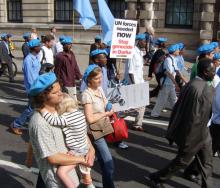
Americans were introduced to Sudan and what is now South Sudan by immigrants, asylum seekers, and refugees like the Lost Boys and Girls of Sudan, who sought protection from a brutal dictatorship in Khartoum. Sudanese turned to the U.S. for a better life not only for themselves but in order to support their family and friends back home, and to advocate for help in stopping genocide, mass atrocities, and human rights abuses committed by an oppressive regime. Many Sudanese captured our hearts not only because of their fight for freedom and their bravery in enduring terrible suffering, but because of their resolve to access the educational and employment opportunities available in the U.S. to prepare themselves to return and help rebuild a country destroyed by decades of state-sponsored violence.
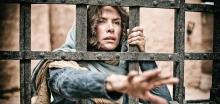
HOW IS IT that a miniseries based on the Good Book could evoke sectarian and violent notions of the Divine that would have seemed backward to some even back in the era of melodramatic biblical epic cinema? The History channel’s The Bible, like so much of so-called “religious pop culture,” seemed to be the product of good people trying to do a good thing, but at best putting the desire to convey a particular message ahead of making the best artwork for the medium.
The politics of The Bible seemed to perpetuate an “us vs. them” lens. It left me wishing for a treatment of scripture presented from the perspective of the marginalized, instead of a portrayal of “victory” as being the deaths of people considered different. Couldn’t someone make an Exodus movie about Moses’ neighbors—you know, the ones who saw God’s favor rest on the boy next door, while their son was killed by a psychopathic king? Or one focused on the myriad people groups considered “unclean” and worthy of genocide at the hands of those who claim to speak for God? Or a rendering of John’s Revelation that understands it as a poem about remarkable beginnings, the battles of the human heart, and a love willing to remake the world to set us free from the traps we’ve laid for ourselves? You don’t even have to be that controversial—can’t someone just make a decent movie about Ruth or any of the many cool women in the gospels?
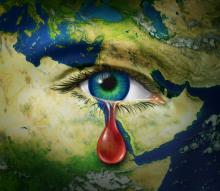
What the heck is going on in Syria? If you are like me, you have a problem keeping all the players straight, and the unfamiliar Arab names don’t help. Thankfully, the Syrian president has a relatively easy name to remember, Bashar al-Assad, but keeping track of who’s who and which side they’re on is a real challenge. Frankly, even when I can keep track, I’m very skeptical that I am getting anything close to the truth from news outlets, the White House, or our State Department. The talk about a “red line,” no-fly zones, arming terrorists, and weapons of mass destruction sounds a lot like the falderal we were being fed going into the Iraq war. So what’s a good citizen of the world to do? If I can’t make sense of the news accounts myself, who can I find to help me out? And if I can’t trust my government to sort out the good guys from the bad guys for me, how can I ever figure out what, if anything, my government should be doing in my name?
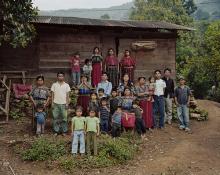
Sunday afternoon, March 28, 1982. If you were an evangelical Christian living in Guatemala, watching TV, your heart would have been beating faster and tears of joy may have flowed down your cheeks.
A man was speaking so thoughtfully, with the Bible in hand. He was teaching the audience, “If there is no peace within the family, there would be no peace in the world. If we want peace, we need at first to be at peace in our hearts.” He went on, “Guatemala is the chosen people of the New Testament.”
That 55-year-old man was Guatemalan General Efrain Rios Montt, pastor of the Iglesia Verbo (Church of the Word), who had recently become president of Guatemala through a military coup.
On May 10, 2013, a Guatemalan court sentenced Rios Montt to 80 years in prison after finding him responsible for deliberate killings by the armed forces of at least 1,771 members of the Maya Ixil population during his 1982-83 rule.

WASHINGTON — The adult survivors of the Holocaust are mostly gone now, and those who survived as children — and were old enough at the time to remember their ordeals — are now in their 70s and 80s.
It won’t be long before no eyewitnesses remain.
That’s why, as the U.S. Holocaust Memorial Museum marks its 20th anniversary today (April 29) with more than 750 survivors, museum officials are calling it one the last large gatherings of those who managed to escape Hitler’s death machine.
For those who have dedicated themselves to teaching future generations about the Holocaust and its victims, the demise of the survivors means looking backward in a different way — a way that no longer includes people looking others straight in the face and recounting what they saw and what they lived.
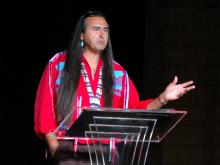
ALL EYES WERE fixed on Richard Twiss, the Lakota/Sioux co-founder and president of Wiconi International, who stood center stage at the 2011 Christian Community Development Association conference.
Twiss pulled no punches as he told the truth about the church's role in colonization: The global genocide of indigenous peoples and the eradication of indigenous cultures by requiring people to cut their hair, leave their families, forsake their languages, and forswear their drums. Coaxed to convert or be damned, indigenous people exchanged their own culture for guitars and mission schools in order to be "Christian."
On Feb. 9, 2013, Richard Twiss passed to the other side of life. For many he was a key voice for indigenous people finding a way to reclaim their culture while keeping hold of Christ. While Twiss was a primary voice of the movement, he was also a member of a larger circle of indigenous leaders, each of whom has played his or her part to establish and spread the good news of cultural reconciliation after "500 years of bad haircuts," as Twiss liked to put it.
Twiss had enormous impact on the indigenous "contextual ministry" movement. "Contextualization means to present the good news of the shalom kingdom of Jesus Christ in a way that people can understand and relate to in their own cultural context," explained Randy Woodley (Keetoowah Cherokee), distinguished associate professor of faith and culture at George Fox Evangelical Seminary.
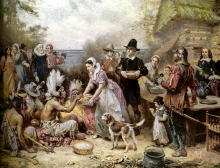
I’m not suggesting we not be thankful. But if it were up to me, I’d repeal the official day of Thanksgiving that was sanctioned by Congress because no matter how we want to re-tell or re-write that story, we are marking an event of injustice.
In removing this day, I’d encourage the whole country to express sorrow for such a grave injustice to the Native Indians and create events and various forms of curriculum in parallel. I’d express gratitude and celebration of the story and legacy of the native Indian people. And I’d put into law that ensures reparation for every single descendant of Native Indians. Furthermore, I’d create a fund to guarantee 100% funding to college for any descendants of Native Indians. This is just for starters….
In my opinion, our treatment of the Native Indians is one of the greatest human tragedies and to ignore its story and context may be the pinnacle of historical revisionism.
Last weekend, I had the privilege of spending some time at the End Genocide Action Summit, which brought people from all over the world to Washington, D.C., to learn about and fight against genocide, particularly the ongoing genocide being waged by Omar al-Bashir against the people of Darfur, Sudan.
We cannot allow the history of a brutal genocide to repeat itself in Sudan, nor denial and inaction to repeat itself in Washington, D.C., but both are happening at this very moment